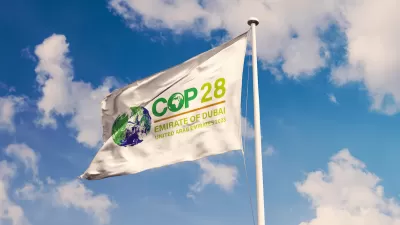President Obama left for Paris on Sunday to partake in the climate talks known as COP21. Coral Davenport of The New York Times looks at the legacy implications for the president stemming from his commitment to fighting climate change.
Paris, the scene of horrific terrorist attacks on November 13 that left 130 dead, is now being transformed into the world-gathering site of landmark climate talks known as the Conference of the Parties (COP) to the 1992 United Nations Framework Convention on Climate Change (UNFCCC).
"This is the 21st meeting (thus COP21), with the first occurring in Berlin in 1995," writes CNN Meteorologist Brandon Miller.
The recent attacks were not lost on President Obama.
"What a powerful rebuke to the terrorists it will be when the world stands as one and shows that we will not be deterred from building a better future for our children," Mr. Obama said at a joint news conference in Washington last week with President François Hollande of France, writes Davenport.
"More than 40,000 delegates from 195 countries are attending COP21 which has the goal of achieving a legally binding agreement to keep global warming below what most scientists say is the critical threshold of 2 degrees Celsius of warming," writes Jethro Mullen, CNN news desk editor. The conference runs through December 11.
The leaders of the United States, China and India -- the world's top three carbon-emitting countries -- are among those scheduled to attend the opening day of the event, known as COP21.
President Obama arrives in Paris on Sunday night, "hoping to make climate policy the signature environmental achievement of his, and perhaps any, presidency," writes Davenport.
But even as Mr. Obama presses for a deal in Paris, it faces steep obstacles, not least the legal and legislative assault on his own regulations at home. During the course of the Paris talks, Republicans in Congress are planning a series of votes to fight Mr. Obama’s climate agenda. More than half the states are suing the administration on the legality of his climate plan. And all the Republican presidential candidates have said that they would undo the regulations if elected.
Scott Horsley, White House correspondent for NPR, delves into the Republican's defiance of Obama's intentions in detail on NPR Weekend Edition (listen here).
The White House is acutely aware of the political opposition here at home. That's why any agreement in Paris will not take the shape of a treaty so it doesn't require Senate ratification. At the same time, the administration is hoping for what it calls a durable agreement to cut carbon emissions, one that would give private investors confidence to keep pushing for less polluting forms of power.
Despite the obstacles posed by his political adversaries at home, COP21 is a legacy-making event for the president, expressed Douglas Brinkley, a presidential historian at Rice University.
“He comes to Paris with a moral authority that no other president has had on the issue of climate change,” said Brinkley, who noted that Mr. Obama’s domestic climate efforts already stand alone in American history. “No other president has had a climate change policy. It makes him unique.”
Check The New York Times webpage, "Paris Climate Change Conference 2015" for their latest articles.
FULL STORY: Obama’s Legacy at Stake in Paris Talks on Climate Accord

Planetizen Federal Action Tracker
A weekly monitor of how Trump’s orders and actions are impacting planners and planning in America.

San Francisco's School District Spent $105M To Build Affordable Housing for Teachers — And That's Just the Beginning
SFUSD joins a growing list of school districts using their land holdings to address housing affordability challenges faced by their own employees.

The Tiny, Adorable $7,000 Car Turning Japan Onto EVs
The single seat Mibot charges from a regular plug as quickly as an iPad, and is about half the price of an average EV.

Trump Approves Futuristic Automated Texas-Mexico Cargo Corridor
The project could remove tens of thousands of commercial trucks from roadways.

Austin's First Single Stair Apartment Building is Officially Underway
Eliminating the requirement for two staircases in multi-story residential buildings lets developers use smaller lots and more flexible designs to create denser housing.

Atlanta Bus System Redesign Will Nearly Triple Access
MARTA's Next Gen Bus Network will retool over 100 bus routes, expand frequent service.
Urban Design for Planners 1: Software Tools
This six-course series explores essential urban design concepts using open source software and equips planners with the tools they need to participate fully in the urban design process.
Planning for Universal Design
Learn the tools for implementing Universal Design in planning regulations.
Smith Gee Studio
City of Charlotte
City of Camden Redevelopment Agency
City of Astoria
Transportation Research & Education Center (TREC) at Portland State University
US High Speed Rail Association
City of Camden Redevelopment Agency
Municipality of Princeton (NJ)



























